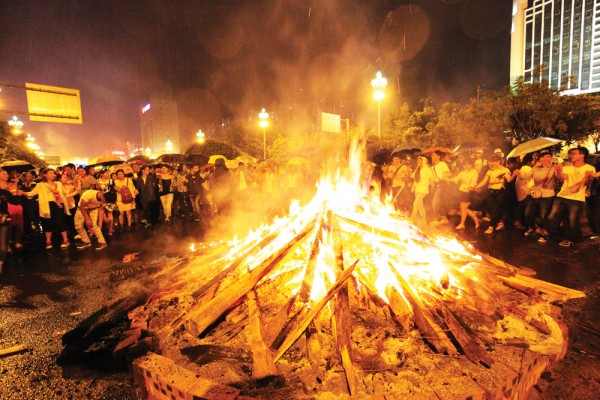
The Torch Festival in Yi Autonomous Prefecture, Liang Shan, Sichuan Province in August
Like all ancient peoples, the Chinese anthropomorphized the turns of the seasons and the ways of the heavens with stories and fables.
This is the way gods are born.
Attempts to explain the laws of nature and physics were overseen by gods and goddessesŌĆöeverything from basic elements like water, fire, and light to aspects closer to ourselves, animals like cattle, butterflies and frogs, as well as ancestors who became omniscient saints. Today, China has a population of 1.3 billion people and 90 percent are Han Chinese; the remaining ten percent, made up of 55 ethnic groups, are remembered, in part, through their deitiesŌĆöbut not the way one might imagine.
These traditional gods may have had, one might argue, a bit of a promotion in the pantheon department in recent years. Indeed, these gods and heroes have been rented out by the authorities who promote them as a symbol of unity and an important tool to promote folk culture and develop the tourism industry.
For example, you have the Guzang Festival (ķ╝ōĶŚÅĶŖé) of the Miao ethnic group, who mainly live in Guizhou and Hunan provinces. According to one version of their legend, 12 different species were bred from a butterfly goddess in the form of eggs, including human. The butterfly goddess failed to hatch one of her sons: a buffalo. She then asked a storm to smash the egg to release the buffalo. When the buffalo grew up, he hated the butterfly mother for not hatching him in person and the butterfly mother died of a broken heart. The buffalo, in turn, refused to help the farmers grow grain, so the other 11 siblings united to kill the buffaloŌĆörevenge for the murder of the butterfly mother. Afterward, cattle worked on farms as beasts of burden.
As a result, the Miao people started to sacrifice their buffalos to honor the butterfly goddess in the hopes of a good harvest to come. According to tradition, every 12 years or so, a grand ceremony was held and during the approximately week-long festival, people sacrificed buffalos, danced, and refused to eat vegetables, speaking only in the Guzang language and eating steamed sweet sticky rice and pig feet.
Today, the festival has omitted the no-vegetable rule, and the six-day festival has turned into a more manageable two-day annual event, filled with more dancing and singing rather than solemn buffalo sacrifice. This way tourists can get a holiday dose of this unique ethnic tradition. In the meantime, many villagers take the opportunity to start their small businesses to make moneyŌĆöacting as dancers and singers or selling hand-made products as vendors.
But some people think such folk culture tourism has lost its roots. "Obviously, younger Miao people know that the butterfly goddess thing is made up, so they use this festival as something to make money rather than keeping a sacred attitude," says Mu Yiyun, a travel columnist based in Shanghai who has traveled to many ethnic areas.┬Ā
Mu says that the handicrafts sold in Guzang Festival are similar to what he sees in other places: factory-made souvenirs like crystal beads, inscribed silver bracelets, knitted baskets, and other tat that can be bought at the local airports and souvenir shops.
"I've been to many god-worshipping ceremonies; at nearly every festival, embedded with ancient belief or not, people dance and sing in groups but sometimes they don't look like they're enjoying it and just perform to entertain the tourists," he says.
Once the ritual becomes entertaining, the core of the culture is weakened, says Feng Jicai, a famous writer and the vice-president of the Chinese Folk Literature and Art Association, adding that the effect it has on the local economy is undeniable.
But, when one considers the barbarity that many ethnic cultures faced in China's recent history, can it really be that bad? Or, rather, can a free market truly accomplish what was started in those bygone years of cruelty? Chinese culture suffered during ten years of Cultural Revolution. Some ceremonies and festivals honoring gods were deemed as "superstitious" and "anti-scientific", and many religious customs were damaged.
Traditionally, every first month of the lunar calendar, the Zhuang ethnic group hosts the Wapo Festival (ĶøÖÕ®åĶŖé), meaning "frog goddess festival" to honor their frog goddess in charge of farmland in the hopes that it will bring a better harvest.
The festival originated in the Donglan County of Guangxi Zhuang Autonomous Region, where the Zhuang, the largest ethnic group among China's 55 ethnic minorities, gather. It is said that a frog was sent by Heaven to Earth to rule over farmland and harvests, but a farmer, annoyed by the croaking sound of frogs, poisoned all the frogs on his land. Not a single grain was reaped in the whole village that year. People realized that killing frogs displeased the frog goddess so they retrieved every murdered frog and gave them a proper burial ceremony.┬Ā
During the vausterity of the Cultural Revolution, the idea of going out to find frogs to sing and dance around was considered to be "offending public decency."┬Ā
But, today, the festival is back with government approval.
Gods of Change" is a story from our newest issue, "Internet Celebrity". To read the whole piece, become a subscriber and receive the full magazine. Alternatively, you can purchase the digital version from the iTunes Store.
Article by Liu Sha (ÕłśĶÄÄ)


















































